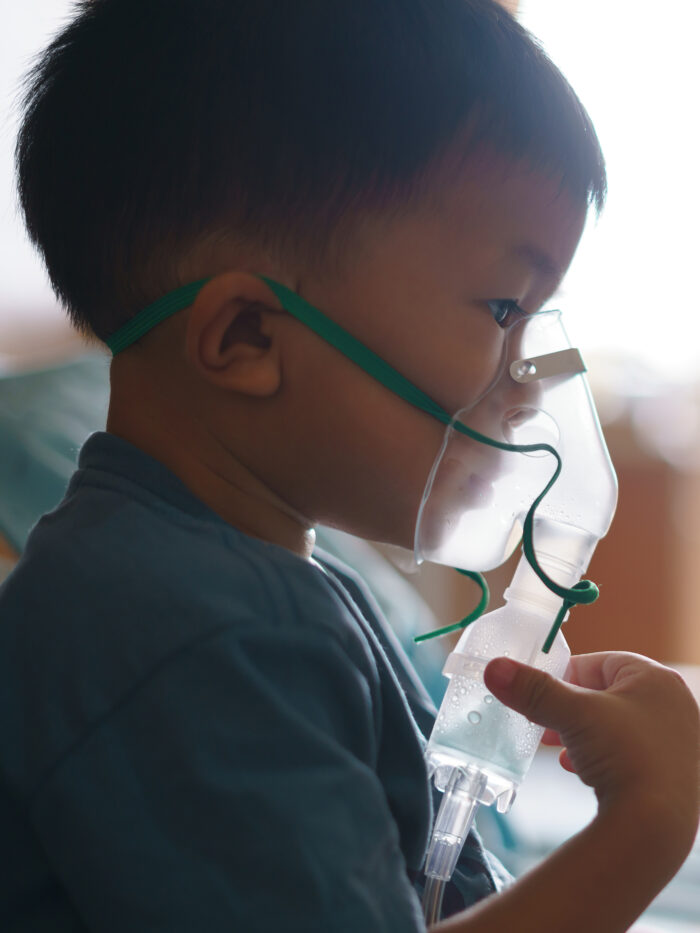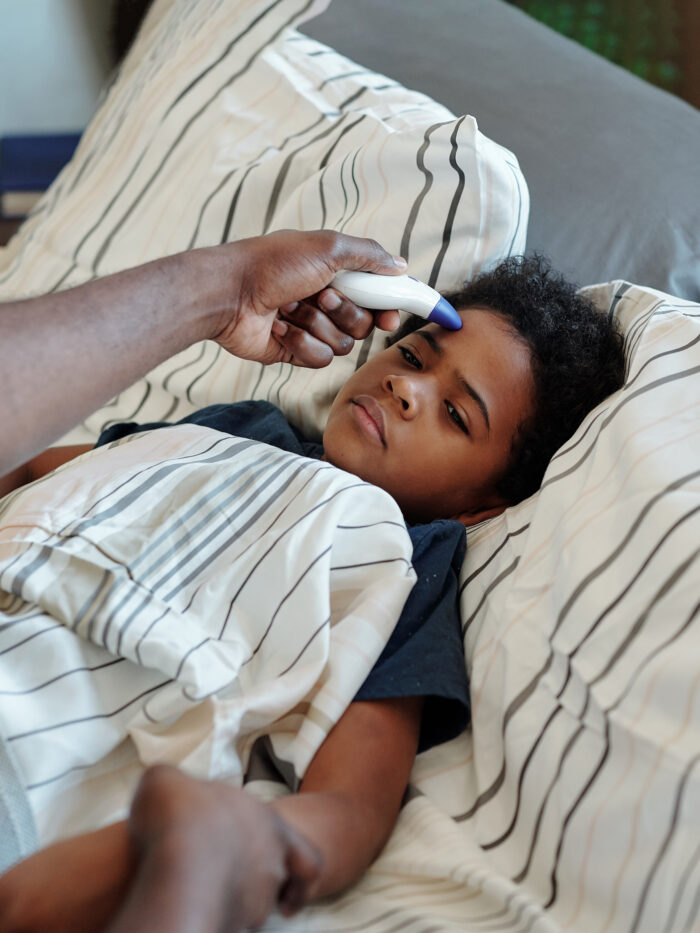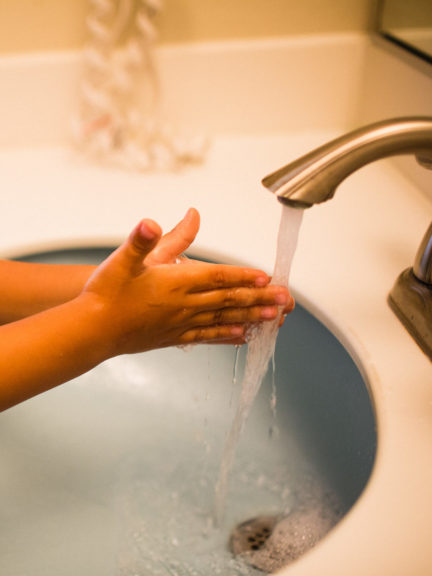GUIDE
Respiratory syncytial virus (RSV)
RSV is a respiratory virus with a large range of symptoms. It can affect all ages but usually acts like a common cold for healthy, older children and adults. However, for premature infants and immunocompromised babies and children, as well as older adults, RSV can make them very sick and sometimes require hospitalization.
Resources
CHOC’s RSV prevention program for high-risk infants
CHOC’s guide to fevers: English I Spanish
CDC RSV prevention infographic: English | Spanish
American Academy of Pediatrics (AAP) guide to RSV
RSV Overview
Nearly all U.S. children will contract an RSV infection by the time they are 2 years old. Due to relaxed COVID-19 restrictions, cases of RSV are popping up earlier and more frequently throughout the U.S.
What is respiratory syncytial virus (RSV)?
Respiratory syncytial virus (RSV) is common, and one of the many viruses that cause respiratory illness ― illnesses of the nose, throat, and lungs. For healthy children, RSV symptoms resemble a common cold, but it may lead some immunosuppressed and young babies to develop lower respiratory illnesses like bronchiolitis and pneumonia.
RSV is spread from respiratory secretions through close contact with infected people or contact with contaminated surfaces or objects. Its typical peak season of transmission is from October to March.
What are the symptoms of respiratory syncytial virus (RSV) in a child?
The early phase of RSV in infants and young children is often mild, like a cold. In children younger than 3 years, the disease may progress into the lower airways and cause coughing and wheezing. In some, the infection progresses to a severe respiratory disease requiring hospitalization to help the child breathe.
RSV is so common that most children will be infected by the time they are 2 years old. This will give them protection against that specific strain of the virus, but they are able to be reinfected by a different strain anytime throughout life.
The following are the most common symptoms of RSV, which may appear two to five days after exposure to the virus. However, each baby may experience symptoms differently. Symptoms may include:
- Runny nose
- Fever
- Cough
- Apnea (periods without breathing)
- Trouble eating, drinking or swallowing
- Wheezing
- Flaring of the nostrils or straining of the chest or stomach while breathing
- Breathing faster than usual, or trouble breathing
The symptoms of RSV may resemble other conditions or medical problems. Always consult your child’s pediatrician for a diagnosis.

Featured Video from the American Academy of Pediatrics
Learn how to identify the signs of RSV in babies in this YouTube video.
Are some children more at risk for contracting respiratory syncytial virus (RSV)?
Yes. A child is more at risk of developing RSV if they are around others with the virus. There are typically outbreaks in the winter and early spring months in communities, classrooms and childcare centers.
RSV can affect both children and adults but is most dangerous for young babies and older people. For older, healthy children and adults, RSV may act like the common cold. Infants (especially premature infants), older adults, people with heart and lung disease or anyone with a weak immune system are at increased risk for developing severe illness from RSV.
This these cases, the infection can spread to the lower respiratory tract, causing pneumonia or bronchiolitis — inflammation of the small airway passages entering the lungs, which can be life threatening. RSV in infancy may also be related to the development of asthma later in childhood.
Call CHOC’s free 24/7 Nurse Advice Line
Our free nurse helpline is open 24/7 to address questions about your child’s health.

Where to go for care for RSV
RSV symptoms are usually at their worst on days two to five of the illness, but most children will recover from an RSV infection on their own. If your child is exhibiting more severe symptoms from RSV, you may need to call your pediatrician for treatment.
When should I call the doctor or take a child with RSV to the hospital?
Call your pediatrician right away if your child has the following symptoms:
- A fever of 100.4°F or higher and is 1 to 3 months of age.
- A fever that rises above 104°F repeatedly.
- Coughing, wheezing, rapid breathing or other symptoms that get worse over time.
- Signs of dehydration, such as fewer wet diapers than usual.
- Cheeks, lips, tongue and inside of mouth appear normal, but hands, arms, legs or feet appear blue.
Visit your nearest emergency department if your child:
- Is under 28 days old with a fever of 100.4°F or more.
- Is having severe trouble breathing.
- Is showing significant changes in their mental state like decreased activity and alertness.
- Cheeks, lips, tongue and inside of mouth appear blue, indicating that your child may have low oxygen.
How is respiratory syncytial virus (RSV) diagnosed?
Healthcare providers usually diagnose a respiratory virus by taking a medical history and doing an exam. In many kids, they don’t need to distinguish RSV from a common cold.
But for children who are assessed by a healthcare provider to have severe respiratory symptoms, their provider will likely want to evaluate them for specific respiratory viruses to determine the best treatment.
Your child’s provider may decide to run a test called respiratory viral panel (RVP) or Flu-Vid. RVP can detect a variety of respiratory illnesses like RSV, enterovirus, rhinovirus, influenza A and B and others. Flu-vid can test for influenza A, influenza B, RSV and Covid-19.
Both tests may be performed at a pediatrician’s office or urgent care, where the provider will collect a sample of your child’s nasal fluids with a cotton swab or by suction through a bulb syringe. Then, they should have the results within a few hours.
What is the treatment for respiratory syncytial virus (RSV) in children?
Specific treatment for RSV will be determined by your baby’s pediatrician based on:
- Your child’s age, overall health, and medical history.
- The extent of the condition.
- Your child’s tolerance for specific medications, procedures or therapies.
There are no medications used to treat the virus itself. Care of a baby with RSV involves treating the effects of the virus on the respiratory system. Because a virus causes the illness, antibiotics are not useful, unless there is also a bacterial infection. If your child is having severe illness and trouble breathing, treatment may also include:
- Supplemental oxygen.
- Breathing treatments.
- Suctioning of mucus.
- Intravenous fluids (to prevent dehydration).
- Tube feedings (if the baby has difficulty sucking).
- Children with very serious breathing problems are intubated and put on ventilators, or breathing tubes are inserted and attached to machines that assist with breathing.
- Children with cheeks, lips, tongue and inside of mouth that appear normal, but hands, arms, legs or feet appear blue will need to be warmed up and hydrated.
What can I do at home to help treat mild cases of respiratory syncytial virus (RSV) in children?
For most children, an RSV infection will be like a cold, and they will recover on their own. Try the following at home to help your child feel better:
- Make your child as comfortable as possible.
- Allow time for recovery, and keep them home from school or childcare to prevent spread.
- Provide plenty of fluids. Babies may not feel like drinking, so offer fluids in small amounts often.
- Avoid hot-water and steam humidifiers, which can be hazardous and can scald skin. If you use a cool-mist humidifier, clean it frequently to prevent mold and bacteria growth.
If your child is too young to blow their own nose, use saline (saltwater) nose spray or drops and a nasal aspirator (or bulb syringe) to remove sticky nasal fluids. Clearing a baby’s nose before offering fluids can make it easier for them to drink.
Treat fever using a non-aspirin fever medicine like acetaminophen or, if your child is older than 6 months, ibuprofen. Do not use over-the-counter cold medicines, which can be dangerous for young children.

Preventing RSV
Just like with most respiratory illnesses, good hygiene, washing hands and avoiding people who are sick can help prevent your children from getting RSV. For eligible babies and young children, the RSV immunization can reduce the risk for illness.
What is the nirsevimab RSV immunization? Is it safe?
Nirsevimab (also known as Beyfortus) is an antibody treatment that can boost immunity to prevent RSV infections in babies and young children.
The treatment is given as a single injection to newborns and infants under 8 months old during their first RSV season. Children up to 19 months who are vulnerable to severe infections from RSV — such as those with congenital heart disease or premature babies with long-term breathing and lung problems —can also receive a dose during their second RSV season.
Nirsevimab has been tested by scientists, and clinical trials showed that the injection could reduce the risk of severe RSV (which may require medical treatment or hospitalization) by 75%.
The U.S. Food and Drug Administration (FDA) and Centers for Disease Control and Prevention (CDC) have approved and recommended its safety for use in protecting infants against RSV.
Who can receive the RSV shot?
The CDC and American Academy of Pediatrics (AAP) recommend that all infants — especially those at high risk for severe RSV — receive the nirsevimab injection. This includes:
- All infants younger than 8 months born during or entering their first RSV season.
- Infants and children aged 8 through 19 months who are at increased risk of severe RSV disease and entering their second RSV season.
If nirsevimab is not available for your eligible child, the AAP suggests the continued use of a medicine called palivizumab (Synagis), which has been given in the past to prevent RSV in babies who are at high risk for infection and complications. Ask your child’s doctor if they may be at high risk for RSV.
Why should my baby receive the nirsevimab RSV shot?
RSV is common, and one of the many viruses that cause respiratory illnesses ― illnesses of the nose, throat, and lungs. For healthy children, RSV symptoms resemble a common cold.
But for immunosuppressed and young babies, RSV may lead to lower respiratory illnesses like bronchiolitis and pneumonia — inflammation of the small airway passages entering the lungs — which can be life-threatening. RSV in infancy may also be related to the development of asthma later in childhood.
In clinical trials, the nirsevimab injection has shown to been proven to lower the need for medical care from RSV for babies by 70% to 75%.
Are there any side effects to the RSV immunization?
Possible side effects of nirsevimab include rash and injection site reactions. Consult your child’s doctor if they typically have allergic reactions to injections or medications.
Is there a reason my child should not get the RSV immunization?
The injection is recommended for most infants and at-risk children if they meet the criteria during RSV season, but be sure to consult your child’s pediatrician for specific guidance for your child. The injection should not be given to any infants or children with known allergies to nirsevimab’s ingredients. Get more information about the nirsevimab RSV injection from the AAP.
How else can respiratory syncytial virus (RSV) be prevented?
The U.S. Center for Disease and Control and Prevention (CDC) recommends that children at high risk for RSV should avoid people with cold-like symptoms. Because RSV is spread through contact with infected people or contaminated surfaces, families should avoid sharing cups, eating utensils and close contact like hugging and kissing with anyone with cold-like symptoms. In addition, practice frequent hand washing and disinfect frequently touched surfaces like doorknobs, counters and phone screens.
To reduce the risk for RSV, the AAP recommends all babies, especially preterm infants:
- Be breastfed.
- Be protected from contact with smoke.
- Limit exposure to crowds, other children and anyone with a cold.
Also, make sure that household members wash their hands or use an alcohol-based hand cleaner before and after touching your baby.
FROM THE NEW YORK TIMES
Several research teams are working on vaccines for young children. One group, led by Dr. Coleen Cunningham, a pediatrician in chief at CHOC and chair of the pediatrics department at the University of California, Irvine, is developing a nasal-drop vaccine containing a weakened version of the virus for children 6 to 24 months of age.
“The advantage of that is, it’s not a shot, so you don’t have to worry about needles,” Dr. Cunningham said. The vaccine would rouse antibodies in the nose, where the virus enters, rather than the blood and so might more effectively prevent infection.
The researchers are trying to find a balance in which the virus is too weak to cause symptoms and yet strong enough to produce a robust immune response. The results so far are promising, Dr. Cunningham said.

RSV & COVID-19
Although COVID-19 is different from RSV, they do share common symptoms. Your pediatrician can help determine which virus your child has.
Is COVID-19 a respiratory syncytial virus?
No. RSV and COVID-19 are both highly contagious respiratory illnesses caused by different viruses; RSV is caused by respiratory syncytial virus and COVID-19 is caused by the SARS-CoV-2 virus.
RSV and COVID-19 may be hard to tell apart due to their shared symptoms: fevers, coughing, shortness of breath, a runny nose, sore throat and headache.
The best way to determine if your child has RSV or COVID-19 is to have them tested for both, if possible, by a healthcare provider.
Can my child have respiratory syncytial virus (RSV) and COVID-19 at the same time?
Yes. It is not uncommon for children to contract two viruses at once. With COVID-19 variants on the rise, it’s possible that there may be more and more children developing RSV and COVID-19 at the same time.
The best way to prevent both RSV and COVID-19 is to have all eligible children get vaccinated for COVID-19, wear a mask, social distancing and wash their hands frequently.
Learn more about your pediatric healthcare options
Use CHOC’s guide to help you determine the best place to take your child for care.
RSV recommended reading
Related guides
For more information, please visit our other health guides and articles.
- Where to go for care guide
- Immunization guide
- COVID guide
- Fever guide: English | Spanish
The guidance on this page has been clinically reviewed by CHOC pediatric experts.
For more health and wellness resources from the pediatric experts at CHOC:
Sign up for the Kids Health newsletter.
The contents of this webpage, including text, graphics, audio files, and videos (“Materials”), are for your general information only. The Materials are not intended to substitute qualified professional or medical advice, diagnoses, or treatments. CHOC does not recommend or endorse any specific tests, physicians, products, procedures, or other information that may be mentioned on or linked to this webpage. Always call your physician or another qualified health provider if you have any questions or problems. If you think you may have a medical emergency, call your doctor, go to the nearest emergency department, or call 911.
For more health information for your family visit health.choc.org







